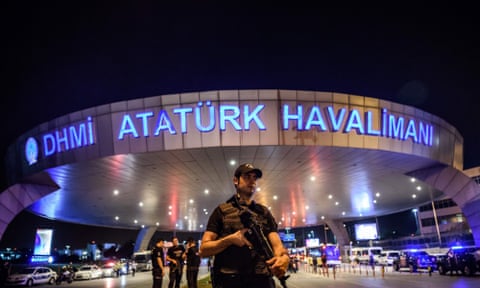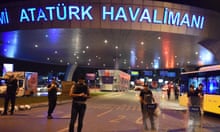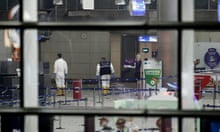Istanbul airport attacked, at least 41 killed
A series of deadly explosions tore through crowds at Atatürk airport in Istanbul on Tuesday, killing at least 41 and wounding at least 239. Turkish officials blamed the attack on Islamic State. According to the Turkish authorities, three gunmen armed with AK-47 rifles engaged security and police in a firefight near the airport’s x-ray security checkpoint then detonated suicide vests. Thirteen foreigners were among the dead.
Turkey airport attack: at least 41 killed in explosions at Istanbul Atatürk
Journalist Laurence Cameron told the Guardian of chaos in the airport’s baggage area: “You could see where the bomb had gone off. There was dust everywhere, ceiling panels on the floor, shattered glass, blood and big piles of dusty luggage that had obviously been abandoned by people.” Outside the terminal, Cameron witnessed “blood smeared on the floor, sirens, at least seven ambulances. Panels at the side of the building had been blown off, the walls were shredded”. For ordinary Turks, the attack follows a pattern of deadly violence, Constanze Letsch reports from Istanbul.
Istanbul airport attack: Isis behind deaths – follow the latest updates
European leaders meet without Britain
Twenty-seven European Union members are expected to reiterate today that the UK must move rapidly to exit the union and should not expect special favours. In a draft communique from the EU summit in Brussels, European leaders also expressed hope that the UK remains “a close partner” but warned that any relationship would be based on “rights and obligations”. Earlier, German chancellor Angela Merkel warned that Britain would not be able to cherry-pick the terms of its future relationship with Europe and that the EU would not negotiate with Britain ahead of the mechanism for leaving, known as article 50, being invoked. In his parting words to the summit as a UK prime minister, Cameron warned that the EU must do more to deal with immigration concerns. Lithuanian president Dalia Grybauskaite indicated that Europeans were keen to move on with business. Tuesday was about Cameron, but Wednesday “is about us, what we are going to do about our unity”.
EU leaders begin summit talks without UK for first time
Scots plan to remain in EU while UK faces leadership vacuum
Meanwhile, Scottish first minister Nicola Sturgeon arrived in Brussels to make her case for Scotland to remain a part of the EU. In London, Brexit leader Boris Johnson said he didn’t believe that if he was elected by the ruling Conservative party to replace David Cameron, he would then need to call a general election. Other potential Conservative leadership candidates include home secretary, Theresa May, and a joint ticket of Stephen Crabb, the pensions secretary, backed by Sajid Javid, the business secretary. The Labour party’s Jeremy Corbyn lost a confidence vote and is now likely to face a challenge to his leadership.
Nicola Sturgeon in Brussels to press case for keeping Scotland in EU
Brexit walk-back? Secretary of state Kerry raises possibility
The US secretary of state John Kerry, in a new, nebulous role as UK-EU mediator, has raised doubts about whether Brexit can ever happen. Kerry, who was in London on Monday, told a conference in Aspen on Tuesday he didn’t think leave campaigners truly believed in Britain’s divorce from Europe. Asked if this meant the Brexit decision could be “walked back”, and if so how, Kerry said: “I think there are a number of ways.” In the UK, there is some discussion of a second referendum. Diplomatic editor Patrick Wintour considers if there is any way back, and writes that the UK parliament could delay the Brexit process “at every turn”.
John Kerry: Brexit could be ‘walked back’
Benghazi report finds no smoking gun but leaves questions unanswered
The 800-page, $7m, Republican-led panel’s congressional report will do little to satisfy those who want to hold Hillary Clinton responsible for the deadly attack on the US mission, but some questions – among them, was the late ambassador Chris Stevens in the provincial Libyan city to prepare for a visit by the secretary of state? – go unaddressed. They include: who launched the attack, why did they do it, and were US actions in post-revolutionary Libya a contributory factor? Committee chairman Trey Gowdy accused Clinton and her staff of a “shameful” lack of cooperation. Clinton’s spokesman Brian Fallon retorted: “The committee report has not found anything to contradict the conclusions of the multiple, earlier investigations.”
Benghazi report rakes over old ground, but some answers are still hard to find
After supreme court victory, abortion still limited across US
Jubilation after the supreme court struck down a law threatening to close half the abortion clinics in Texas disguises the reality that many women are still traveling farther, and spending more money to have abortions than any time in recent memory, writes Molly Redden. Texas, Arkansas, Alabama and Tennessee in the south, and states such as Wisconsin, Michigan and Ohio have lost around 40 clinics in the past five years. Large swathes of Mississippi and Louisiana are also without providers. Reopening clinics in Texas may take years.
Abortion access still strained even after landmark US supreme court ruling
Lionel Messi’s retirement continues to roil Argentina
Argentina’s penalty kick loss to Chile in the Copa America final last weekend caused the 29-year-old Barcelona striker – one the greatest to have played the sport – to announce his retirement from international soccer. Messi’s international career highlights the fraught marriage – and its divisions – between football and a country that has failed to win a major title in nearly a quarter of a century.
Lionel Messi, forgiveness and the retirement that divided Argentina
In case you missed it ...
The author of a Marvel comic, Civil War II: Choosing Sides, which features Canadian prime minister Justin Trudeau, acknowledged this is “basically Trudeau fan fiction. He seems to be the popular culture association with Canada right now, right behind [Toronto rapper] Drake – and I probably couldn’t get Drake in the comic,” Chip Zdarsky told the Canadian Press.
Canadian prime minister Justin Trudeau is hero in new Marvel comic








